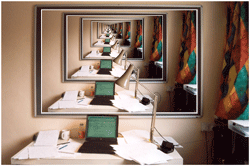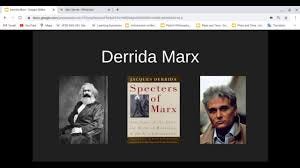A few words of warning to begin with.
One problem with this essay is that it’s an account of Jacques Derrida from a person who’s mainly influenced by analytic philosophy. What’s more, the main quotes used in this piece are taken from an analytic philosopher. That said, I have read (some of) Derrida’s papers/books and I’ve even written essays on them. The problem remains, however, is that I never felt that I understood what was being said. Perhaps that’s because — at least in some cases — nothing was being said.
(See the final section of this essay for more on my philosophical bias regarding Derrida.)
Deconstruction and Self-Reference

[In the following, I shall use the word “concept” in its everyday non-philosophical sense. In technical philosophy, a concept is seen to be the “semantic content” of a natural-language word, an abstract object, something in the brain, something in the mind, etc.]
When characterising Jacques Derrida (1930–2004), the philosopher Howard Dainton (paraphrasing Gary Gutting, who was sympathetic to Derrida) states one of Derrida’s (“under erasure”) p̶o̶s̶i̶t̶i̶o̶n̶s̶ in this way:
“[E]very concept deconstructs itself.”
The self-referential problems here seem almost too obvious to point out.
Does the concept/idea [every concept deconstructs itself] also deconstruct itself? Or, more accurately, do the concepts used to advance the position that every concept deconstructs itself also deconstruct themselves?
If they don’t, then why don’t they do so?
And if they do, then where do we go from there?
Similarly, does the position (using the words of Howard Dainton again) that
“contradictions can never be avoided”
also involve contradictions which can never be avoided?
If it doesn’t, then why doesn’t it do so?
And if it does, then where do we go from there?
But let’s be more specific and concrete about these often poetic and oracular phrases from Derrida.
Of course Derrida probably never said that “every concept deconstructs itself” in such a simplistic — or clear! — manner. That said, if you Google the words “every concept deconstructs itself” and “contradictions which can never be avoided” you will find dozens or even hundreds of quotes from both Derrida himself and references to those who have (positively) interpreted him as holding precisely these positions. (See here and here.)
Despite stating all that, this may simply be an analytic philosopher’s misreading of deconstruction. Ironically enough, Derrida himself claimed that “all readings are misreadings” (see here). Yet, at the very same time, many devotees of Derrida feel very strongly about certain (mainly political) misreadings (see here) — as did Derrida himself! In any case, misreadings of Derrida may be of the kind that Professor Christina Howells warns her fellow academic experts against (see final section).
So if these ways of putting Derrida’s position are too simplistic (or simply too clear), then are there better ways of putting them?
Of course if Derrida did believe that every concept deconstructs itself (even if he never actually used the words “every concept deconstructs itself”), then you can bet that any (as it were) more faithful way expressing his position (say, as expressed by a follower of Derrida) will be difficult to understand. That is unless one is an academic devotee of Derrida. And even if one is a devotee of Derrida, then there’ll still be no guarantee that any two such people will agree on their readings of Derrida. In fact, they often don’t!
What’s more, if every concept deconstructs itself, then perhaps agreement — or even mutual understanding — is impossible.
The Concepts Used To Fight Injustice

When deconstruction was fully played out (or taken to its various philosophical conclusions), Derrida often didn’t like the resultant readings of his work. More broadly, Derrida had problems — in his later years especially — with the philosophical freedom deconstruction was supposed to allow. (Or was it? Or wasn’t it? Or both? Or neither? Or…?) Basically, Derrida clearly believed that at least some concepts did not deconstruct themselves.
This is where politics inevitably enters the equation.
For example, do the concepts used to fight racism, sexism, fascism, capitalism and injustice deconstruct themselves?
These political isms have been mentioned because they’re precisely the political isms most poststructuralists, etc. fought against using Derrida’s deconstructive weapons.
Surely if every concept deconstruct itself, then these concepts must do so too.
These political underpinnings of deconstruction are mentioned to highlight a problem. And that problem was graphically pointed out by Thomas A. McCarthy. This is how he put it:
“Deconstruction can hardly give voice to the excluded other. The wholesale character of its critique of logocentrism deprives it of any language in which to do so.”
And that’s the primary reason why Derrida didn’t — and perhaps couldn’t — even hint at anything directly (rather than tangentially) political — at least not until his (explicit) “political turn” in the 1990s. Hence the prior obscure, ineffable and (it can be easily argued) pretentious prose.
This is McCarthy again:
“It is [] merely by accident that his writings contain little analysis of political institutions and arrangements, historical circumstances and tendencies, or social groups and social movements, and no constructions of right and good, justice and fairness, legitimacy and legality?”
McCarthy believes that Deconstruction and/or post-structuralism attempted to “liberate the Other”. The problem is that there’s an indefinite number of Others. And many Others are also at mutual odds with each other. Yet surely only a shared language — the language that deconstruction rejected or deconstructed — can help liberate any given Other.
More particularly, isn’t it the case that the words ‘legality’, ‘legitimacy’, ‘fairness’, ‘justice’ are very good examples of transcendental signifieds — at least according to Derrida’s own book (or “text”)? Thus Derrida’s only interest in philosophical words or concepts (until the 1990s) was to violently deconstruct them. If he hadn’t done that, then his whole enterprise would have self-destructed (if not deconstructed) itself.
In the end, however, Derrida’s politics did trump his philosophy when he more or less (re?)embraced Marxism and made some very logocentric statements about, for example, (platonic!) Justice (see here). And he did so largely in response to what he took to be various (political) misreadings(!) of his own work.
More specifically, Derrida only started to wax lyrically — and explicitly — about Karl Marx, Justice, etc. late in his life. For example, when he wrote his Specters of Marx in 1993 — some 40 or more years after he first started writing philosophy.
This was Derrida’s “political turn”.
(Many of Derrida’s followers and admirers have stated that politics or “Ethics” imbued all his work from the very beginning.)
Now take the words of Professor Simon Critchley when he tackled Derrida’s (supposed?) relativism. He said:
“[]Derrida, who is always perceived as a relativist. []In Derrida’s later work, we see him moving more and more explicitly towards a defence of a normative universalism, and a belief in the undeconstructability of justice, as he puts it, which is an overarching value that cannot be relativised.”
Is the above a misreading? Indeed, what would make it either a True Reading or a misreading?
But what of Derrida himself?
In Specters of Marx, Derrida gave a very-positive appraisal of both Karl Marx and Marxism. For example, Derrida wrote:
“The name of New International is given here to what calls to the friendship of an alliance without institution among those who … continue to be inspired by at least one of the spirits of Marx or of Marxism. It is a call for them to ally themselves, in a new, concrete and real way… in the critique of the state of international law, the concepts of State and nation, and so forth: in order to renew this critique, and especially to radicalise it.”
So did misreadings of Derrida also include the concept that every concept deconstructs itself? Of course if every concept deconstructs itself, then Derrida (as already stated) could never have stated that “every concept deconstructs itself” simply or clearly. Instead Derrida “played with the sign”. That is, he played philosophical games… Until, that is, he realised the negative political effects of deconstruction’s free-for-all play. (This is something that Marxists and others on the Left were keen to point out about Derrida’s work; as well as about the work of various postmodernists.)
(Derrida one wrote this: “To risk meaning nothing is to start to play.”)
So, again, where does that leave the concepts used to fight racism, fascism, capitalism, sexism and injustice generally?
More specifically, does the concept [deconstruction] deconstruct itself?
If it doesn’t, then why doesn’t it do so?
And if it does, then where to we go from there?
Derrida might well have “argued” that the concept [deconstruction] does indeed deconstruct itself — in order to prove his point. On the other hand, he did (more or less) argue that the concept [deconstruction] isn’t a concept at all! That, to many, was simply Derrida playing another one of his philosophical games again.
Again, do the concepts used to fight racism, fascism, sexism, capitalism and injustice also deconstruct themselves? More specifically, would Derrida have ever “interrogated” those political activists who freely used many (logocentric) concepts (i.e., from Western philosophy) to further leftwing political goals and causes? Or did Derrida only interrogate those selected bad concepts used by the philosophers, politicians and laypeople he had political problems with? (Derrida and his followers often used the word “interrogate” — see here.)
As a politically committed individual, it would have been very difficult philosophically, and very problematic politically, for Derrida to ever have argued that the concepts used against racism, fascism, capitalism, sexism and injustice deconstructed themselves because that would have rendered these concepts — as well as the activists who used them — politically impotent had they acted on his words. Yet, of course, Derrida never did argue that. Instead, Derrida only had other concepts in mind — (politically) bad concepts.
(Bad concepts such as [truth], [logic], [objectivity], [logos] [God], [nationalism], [race], [universality], [reason], [profit], etc.)
Conceit and Deconstructive Play

Why would a philosopher or anyone else (to quote Howard Dainton again)
“play with the conceits that lie in the interstices of concepts”
in the first place?
Moreover, perhaps deconstructive gameplaying makes
“straightforward rational discourse impossible [because] one can only play with the conceits that lie in the interstices of concepts”.
Would someone’s reasons for indulging in deconstructive play themselves involve self-deconstructing concepts and contain essential contradictions? Thus how could such a philosopher have any moral, political and/or philosophical reasons (or motivations) to do anything at all if every concept deconstructs itself? Again, would that include concepts used against racism, fascism, capitalism, sexism, injustice and also used to defend deconstruction itself?
So what is all this deconstructive play really about?
What is its goal?
Many would argue that it’s primary goal is (or was) political.
Yet that partly backfired — at least on my own reading of Derrida’s strongly negative reactions to some (political) misreadings of his own work.
To repeat: how could deconstruction have had any goals at all if every concept deconstructs itself? So perhaps Derrida and his followers believed that some concepts don’t actually deconstruct themselves. Only politically bad concepts do.
Christina Howells vs. “Analytic” Accounts of Derrida’s Work

As stated in the introduction, the problem here is that this is an account of Jacques Derrida using quotes from from an (English) analytic philosopher.
But is that really a problem?
According Professor Christina Howells (of the University of Oxford) it certainly is. For example, she says that
“there is a risk of [analytic philosophers] transforming [continental] philosophers into something they’re not, and making them say something they weren’t saying”.
Why is that? Howells says it’s because
“we’d loose much of the specificity that way, and you could we be left with banality”.
Howells then goes on to say that
“when you extract from a long elaborated discussion a kernel which is then acceptable to analytic philosophy, whether it is about being with others, or about what Derrida might mean by différance, if he were prepared to express it quite differently, you’ve lost too much”.
So what happened to The Death of the Author? And what about Jacques Derrida’s “interpretative play” and there being “no outside-text” (il n’y a pas de hors-texte)?
In any case, I had no choice but to rely on writers like Dainton because I simply don’t understand much deconstructive and/or poststructuralist prose — at least as it is advanced from the inside.
Let me repeat that:
I don’t understand most of what is said by these academics and philosophers.
And that’s the case even after attempting to do so for a long time. Now that may simply be because I’m plain thick. Either that or I haven’t embedded myself deeply enough, and for long enough, in this academic milieu. That said, my current cognitive situation (along with many other educated people as regards Derrida) is what it is.
So where do we go from here?
Is there a midway position between the critical positions adopted by some analytic philosophers and Derrida’s own tribal academic devotees?









No comments:
Post a Comment